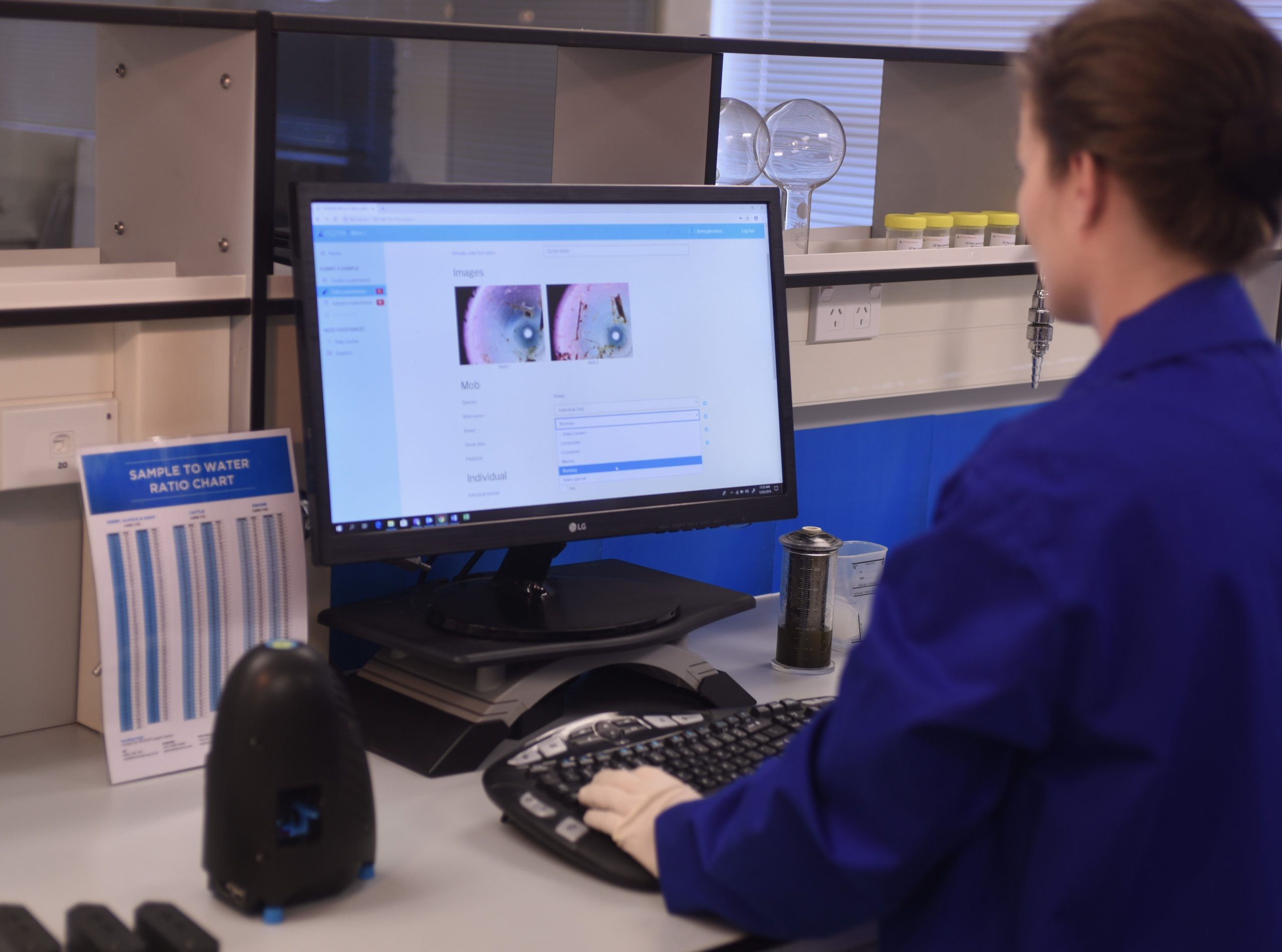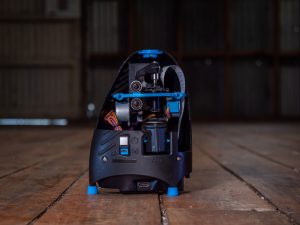New Zealand is famous for its large sheep population, and it’s home to some of the most innovative solutions for keeping them happy and healthy. A small team of “muddy boots developers” in Mosgiel is quietly tackling the number one health problem for production animals – parasites – with the help of AI experts Aware and Microsoft’s cloud stack. The collaboration is generating a revolution in how we detect and treat illnesses not just in animals, but in people worldwide.
We’ve all heard of the environmental impact of cow farts, thanks to the way they produce methane. But there’s a less-known environmental issue on our farms – the impact of parasites in animals like sheep, cattle, horses, pigs and even alpacas.
Parasites pose a dual threat for affected animals, impacting their health and contributing to increased greenhouse gas emissions. For farmers parasites reduce stock weight gain and increase costs for treatment and feed.
Sheep infected with parasites receive less nutrients from their diet and suffer gut damage, potentially leading to lower returns to the farmer, who has to spend more on feed and often sell stock at a lower weights. The consequences extend far beyond the animals; infected sheep emit more greenhouse gases to the tune of about 30 per cent.
For decades, farmers had little option but to preventatively drench their animals. Without an easy way to tell which animals or mobs are impacted by parasites, that often means treating all the animals – even if they don’t have parasites.
While initially effective, this approach has led to the development of drench resistance. Industry analysis shows undetected drench resistance is costing New Zealand farmers $98 million a year in lost revenue. For a farm producing 4,000 lambs a year, that works out to around $81,000 per annum.
“When drenches are failing due to drench resistance, farmers often struggle to understand what is going wrong. The critical part is knowing which drenches are working and which are not. It’s one of the biggest issues facing animal production on the planet,” explains Greg Mirams, farmer by trade and founder of Mosgiel company Techion.
For more than 30 years, Techion has been working in the field and has a range of solutions that help famers transition from an expensive preventative treat and hope approach, to an informed, evidence based approach. Techion employs a team of “muddy boots” developers who understand the paddock as well as software development. This practical experience shapes Techion’s approach to solving a significant problem for agriculture – but its success brought its own challenges for the company.
To manage the growing number of faecal egg count (FEC) tests being submitted by its farmer and vet customers, Techion needed to hire more staff to analyse and annotate sample images submitted online, meaning scaling was a challenge. The company also needed a way to enable real-time diagnosis so farmers can make fast accurate decisions. That’s when Greg and his team were introduced to another ground-breaking Kiwi business – AI specialists Aware.
Microscopes in the field
In 1992, Greg had the groundbreaking idea to help farmers understand the prevalence of parasites in their sheep flocks. “The first product was essentially a microscope in a box,” he says.
Greg travelled New Zealand with his original FECPAK product that contained a microscope, training farmers to take samples and count the parasite eggs in their sheep poo. That flipped the accepted practice on its head; knowing the faecal egg count level allowed farmers to decide which mobs of sheep needed treatment, instead of assuming that drenching was required.
“We first began digitising the platform in 2012, allowing for remote analysis of FEC samples and collection of data over time, and in 2019 we realised there was an amazing opportunity to leverage machine learning and AI to improve it further,” says Greg.
Digital diagnosis provided more consistent and reliable results with FEC test images uploaded automatically to the cloud for offsite assessment by the company’s technicians. This enabled farmers to quickly access results without needing to courier samples to a lab.
However, diagnosing parasite levels is still a time-consuming and expensive process. They needed a way to scale the operation, letting technology take the load. That’s where Aware came in.
“We had recently built a solution to accurately count large groups of people in images, something that had traditionally been very hard to do,” recalls Aware Chief Technology Officer Jourdan Templeton. “As luck would have it, taking that core technology and translating it to analysing samples for parasite eggs was quite an easy job. Because Techion had been collecting and organising digital data on parasite eggs for years, they were in the perfect position for us to train a new model that could not only recognise parasite eggs but count them, to provide an accurate assessment of whether treatment was needed.”
Together, they built on the groundbreaking FECPAKG2 platform. The platform integrates Techion’s hardware, software and analysis skills with Aware’s AI smarts, which utilise Microsoft’s technology stack to truly revolutionise digital diagnostics.
The core of the FECPAKG2 system is the Micro-I digital microscope. Manufactured by local suppliers and Techion’s team in Mosgiel, the Micro-I is a portable, standalone digital microscope that can be used in the field by anyone with minimal training. It is a multi-functional slide scanner, powered by a portable on-board computer. The Micro-I is supported by Techion’s RATA software platform, which securely stores all data in Microsoft Azure cloud and allows approved advisors to review results and advise farmers on diagnosis and treatment.
The platform uses ”augmented AI” in Azure Machine Learning Workspace to interpret test images so people (whether farmers, vets or clinicians) receive their FEC test results faster, which allows them to decide on treatment quickly. With the AI enhancements, farmers receive a result within seconds, giving them an instant indication of whether a certain group of animals need treating. Azure Scalable Compute flexibly deploys AI models, ensuring seamless service worldwide without latency or downtime to a fluctuating user base.
With Kiwi farmers spending approximately $150 million a year on drenches to address parasites, this has the potential to save huge amounts of money, while also mitigating the health impacts on animals that over-medication can create.
“It’s a game changer for farmers,” says Greg. “Our platform has taken us from treatment based on a timetable or a best guess, to treatment based on information – we don’t treat it unless there is a problem identified. A study undertaken with farmers in the UK and NZ by UK retailer Sainsbury’s showed regular FEC testing cut drench use between 30 and 50 per cent without compromising animal performance.”
FECPAKG2 has now been rolled out for parasite testing in production animals including cattle, equine, pigs, and birds and is sold in New Zealand, Australia, the UK and throughout the world.
Whereas Techion used to need multiple technicians to analyse and annotate the images, AI has automated a lot of the process, making the solution scalable – and making analysis much faster. But its applications go a lot further still.
From farmer’s friend to human health revolution
Techion subscribes to the One Health approach, which recognises the health of people is closely connected to that of animals and the environment. During Covid, the Techion team realised that the solutions they had designed for agriculture were applicable to all kinds of different challenges. The Micro-I is portable and easy to use, and combined with the RATA platform , it can be deployed in labs or in the field to support remote communities.
The 30-strong Techion team is now developing AI-powered solutions to diagnose a range of conditions affecting animals, the environment and people. Think checking drinking water for bacteria or testing joints to see if inflammation is from arthritis or an infection, or detecting tropical diseases such as schistosomiasis.
“Ninety per cent of what we’ve done in agriculture is completely transferable. It’s essentially image analysis, which can be replicated with some minor changes for diagnosis of human illness and environmental issues,” Greg explains.
Aware is working with Techion to build a global database of images that everyone can benefit from. Whenever a new clinical area is identified, Aware can set up a new training model in Azure Machine Learning Workspace.
“We’ve co-invested in a new Machine Learning as a Service training model, which we host on behalf of the customer in Microsoft Azure, to expand their revenue streams,” says Aware Director of Sales, Fraser Paine. “And with the Microsoft datacenter region opening here next year, that will enable health providers to process all their data in New Zealand if they want to, to meet compliance requirements, which opens so many more doors for collaboration.”
The beauty is that the new database enables highly-skilled specialists, whose decades of expertise in niche areas are almost impossible to replicate, to train machine learning to pass on their skills to the next generation. As well as enabling industry and academics to utilise its equipment and open-access software, Techion is now investigating further partnerships with academics and Microsoft to tackle diseases that have traditionally been difficult or uneconomic for pharmaceutical companies to combat.
“Techion really epitomises the famous Kiwi number eight wire spirit,” says Matt Bostwick, Channel Partner Director at Microsoft ANZ. “That a small team in Mosgiel, working with a tech company from Hamilton, can reshape the way we diagnose and treatment illnesses around the globe just goes to show that life-changing, cloud and AI-driven innovation is happening right here in our backyard. Aware has been leading the way on applying AI to complex problems, and I’m super excited to see how we can support them and Techion to dial up the impact a million times more.”
As Greg puts it: “We don’t even know how good this could get yet.”


